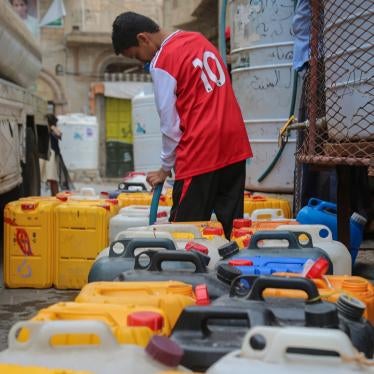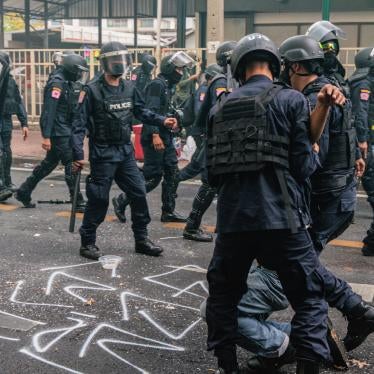(New York) -The Iranian government should immediately release ailing political prisoner Behrooz Javid-Tehrani, a human rights activist first arrested during 1999 nationwide student protests, and ensure he has access to adequate medical care, Human Rights Watch said today. Javid-Tehrani, who has been continually detained since 2005, is on hunger strike and suffers from health problems caused by prolonged torture.
A student activist and leading defender of the rights of political prisoners and their families, Javid-Tehrani has spent the last 10 years in and out ofprison. He is currently held in the "doghouse" section of the infamous Gohar Dasht prison in Karaj city, north of Tehran, with his hands and feet cuffed.
"Behrooz Javid-Tehrani, who is critically ill, is in prison for his peaceful political dissent and his human rights advocacy," said Sarah Leah Whitson, Middle East director at Human Rights Watch. "He should never have been imprisoned in the first place and he should be released at once or he will likely die in prison."
Javid-Tehrani, 29, has never had access to a lawyer, and has had limited access to his family since his 2005 arrest. Despite an independent medical examination in 2006 that confirmed he had been tortured while in prison, Javid-Tehrani has been refused release to obtain needed medical care. Amongst his current known ailments are fresh bruises and wounds to his body as well as the loss of 50 percent of his eyesight due to head injuries inflicted by his interrogators in prison. In addition, authorities have not provided adequate medical care during his 18-day hunger strike, according to his friend Kianoosh Sanjari, a human rights activist who was a fellow inmate during part of Javid-Tehrani's term inEvin prison in Tehran.
Iranian officials first detained Javid-Tehrani on July 9, 1999, when he was 19, as he participated in student demonstrations that spread across Iran. He was sentenced to eight years in prison on charges of "acting against national security." Four years into his sentence, his sister phoned him to say their mother had passed away but the Iranian Judiciary refused to let him attend his mother's burial. His sentence was later commuted and he was released in late 2003.
In 2004, he was detained twice, both times for demonstrating for the rights of political prisoners and their families in front of the United Nations offices in Tehran. Prison officials interrogated and tortured him in Section 209 of Evin prison in Tehran, Kianoosh Sanjari told Human Rights Watch. Sanjari became aware of Javid-Tehrani's torture in Evin because of the close proximity of their cells and the fact that they shared the same interrogator, an official who goes by the name of Saeed Sheikhan.
In 2005, ahead of the presidential elections won by Mahmoud Ahmadinejad, Javid-Tehrani and others in an organization called Jebhe-ye Democratic-e Iran(the Iranian Democratic Front), organized activities such as putting up posters, distributing fliers, and writing political graffiti to protest the lack of transparency and lack of democracy in Iranian elections. The group also raised funds to help families of political prisoners and made short films interviewing the families.
After Javid-Tehrani interviewed political prisoner Akbar Mohammadi during the latter's temporary release and shortly before Mohammadi's death under suspicious circumstances during a hungerstrike in prison, he was again arrested in 2005. According to Sanjari, that interview was of special interest to prison officials, who raised it repeatedly during their interrogations of both friends.
The head judge at Branch 26 of the Revolutionary Court in Tehran, Judge Hasan Zare Dehnavi, known as Judge Hadad, sentenced Javid-Tehrani to four years in prison for membership in an "illegal" organization (the Iranian DemocraticFront) that "acts against state security," 40 lashes for "insulting the leadership and the state," and three-and-a-half years on charges of belonging to the Mojahedin'e Khalgh Organization (MKO). According to Sanjari, this charge was fabricated by the interrogator Sheikhan and furthered by a personal conflict with Judge Hadad, the judge who later sentenced Iranian-American journalist Roxana Saberi to eight years for espionage.
An appeals court reduced the sentence on the MKO charge by six months. Javid-Tehrani has now served more than half his 2005 sentence. Most prisoners in Iran are eligible for release after serving half of their sentence, but he has not been granted even one day of customary temporary release since 2005.
Human Rights Watch is concerned that Javid-Tehrani's life is in immediate danger, in light of the suspicious deaths of political prisoners at Gohar Dasht prison (also known as Rajayi Shahr), most recently that of Amir Heshmat Saran in March 2009. Gohar Dasht was one of the main sites of the 1988 mass summary executions of political prisoners which killed thousands.
"Amongst Iran's political prisoners, Gohar Dasht prison is known as the ‘doghouse' because prisoners are sent there to die," said Whitson. "The Iranian government is legally bound to ensure safety and provide healthcare for all its prisoners. But it has consistently failed to do so for political prisoners, with deadly results."
Human Rights Watch urged Iranian authorities to release Javid-Tehrani immediately and end its persecution of peaceful critics and dissidents.
برای انتشار فوری
جان زندانی سیاسی در خطر است
https://www.hrw.org/en/news/2009/05/23






